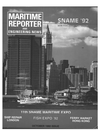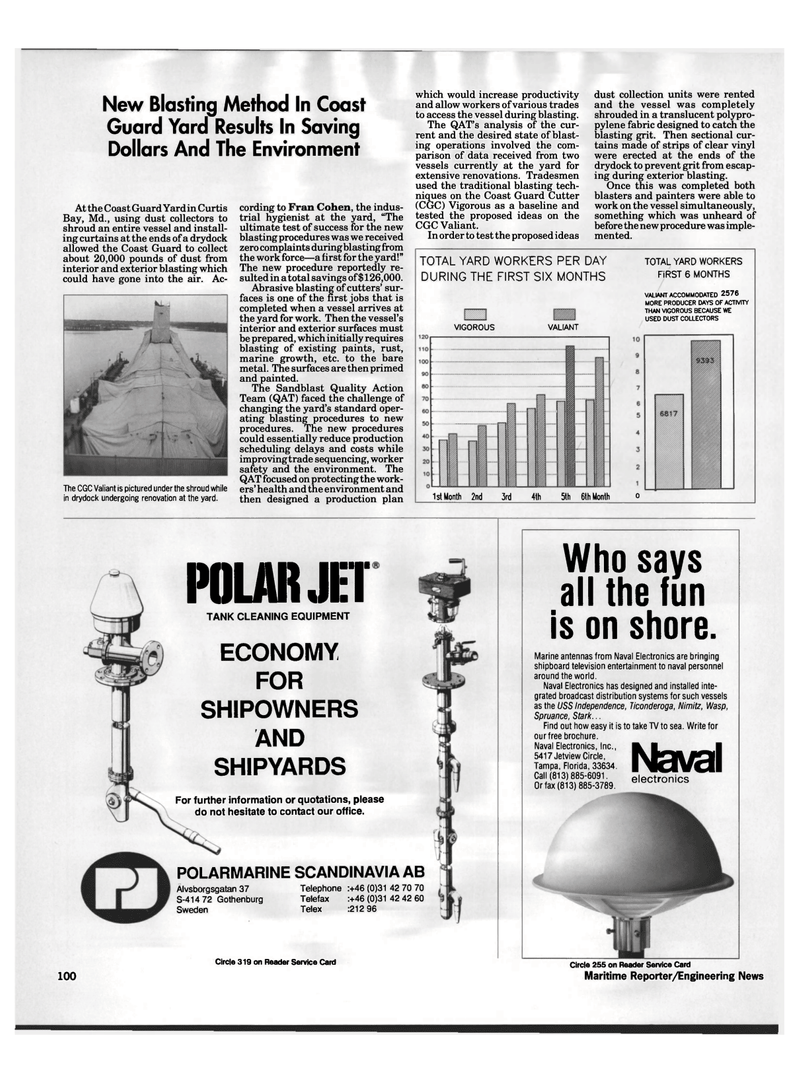
Page 99: of Maritime Reporter Magazine (October 1992)
Read this page in Pdf, Flash or Html5 edition of October 1992 Maritime Reporter Magazine
New Blasting Method In Coast
Guard Yard Results In Saving
Dollars And The Environment
At the Coast Guard Yard in Curtis
Bay, Md., using dust collectors to shroud an entire vessel and install- ing curtains at the ends of a drydock allowed the Coast Guard to collect about 20,000 pounds of dust from interior and exterior blasting which could have gone into the air. Ac-
The CGC Valiant Is pictured under the shroud while in drydock undergoing renovation at the yard. cording to Fran Cohen, the indus- trial hygienist at the yard, "The ultimate test of success for the new blasting procedures was we received zero complaints during blasting from the work force—a first for the yard!"
The new procedure reportedly re- sulted in a total savings of $126,000.
Abrasive blasting of cutters' sur- faces is one of the first jobs that is completed when a vessel arrives at the yard for work. Then the vessel's interior and exterior surfaces must be prepared, which initially requires blasting of existing paints, rust, marine growth, etc. to the bare metal. The surfaces are then primed and painted.
The Sandblast Quality Action
Team (QAT) faced the challenge of changing the yard's standard oper- ating blasting procedures to new procedures. The new procedures could essentially reduce production scheduling delays and costs while improving trade sequencing, worker safety and the environment. The
QAT focused on protecting the work- ers' health and the environment and then designed a production plan which would increase productivity and allow workers of various trades to access the vessel during blasting.
The QAT's analysis of the cur- rent and the desired state of blast- ing operations involved the com- parison of data received from two vessels currently at the yard for extensive renovations. Tradesmen used the traditional blasting tech- niques on the Coast Guard Cutter (CGC) Vigorous as a baseline and tested the proposed ideas on the
CGC Valiant.
In order to test the proposed ideas dust collection units were rented and the vessel was completely shrouded in a translucent polypro- pylene fabric designed to catch the blasting grit. Then sectional cur- tains made of strips of clear vinyl were erected at the ends of the drydock to prevent grit from escap- ing during exterior blasting.
Once this was completed both blasters and painters were able to work on the vessel simultaneously, something which was unheard of before the new procedure was imple- mented.
Circle 319 on Reader Service Card 100
Who says all the fun is on shore.
Marine antennas from Naval Electronics are bringing shipboard television entertainment to naval personnel around the world.
Naval Electronics has designed and installed inte- grated broadcast distribution systems for such vessels as the USS Independence, Ticonderoga, Nimitz, Wasp,
Spruance, Stark...
Find out how easy it is to take TV to sea. Write for our free brochure.
Naval Electronics, Inc., 5417 Jetview Circle,
Tampa, Florida, 33634.
Call (813)885-6091. o|prtrnnir
Or fax (813) 885-3789. e'ecxronics
Naval
Circle 255 on Reader Service Card
Maritime Reporter/Engineering News
ECONOMY
FOR
SHIPOWNERS
AND
SHIPYARDS
For further information or quotations, please do not hesitate to contact our office.
POLAR JET
TANK CLEANING EQUIPMENT
POLARMARINE SCANDINAVIA AB
Alvsborgsgatan 37
S-414 72 Gothenburg
Sweden
Telephone :+46 (0)31 42 70 70
Telefax :+46 (0)31 42 42 60
Telex :212 96
TOTAL YARD WORKERS PER DAY TOTAL YARD WORKERS
DURING THE FIRST SIX MONTHS firST 6 M0NTHS 1st Month 2nd 3rd 4th 5th 6th Month o
VIGOROUS VALIANT
VALIANT ACCOMMODATED 2576
MORE PRODUCER DAYS OF ACTIVITY
THAN VIGOROUS BECAUSE WE
USED DUST COLLECTORS

 98
98

 100
100
